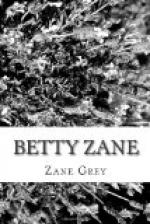Isaac took part in all these pleasures; he entered into every phase of the Indian’s life; he hunted, worked, played, danced, and sang with faithfulness. But when the long, dreary winter days came with their ice-laden breezes, enforcing idleness on the Indians, he became restless. Sometimes for days he would be morose and gloomy, keeping beside his own tent and not mingling with the Indians. At such times Myeerah did not question him.
Even in his happier hours his diversions were not many. He never tired of watching and studying the Indian children. When he had an opportunity without being observed, which was seldom, he amused himself with the papooses. The Indian baby was strapped to a flat piece of wood and covered with a broad flap of buckskin. The squaws hung these primitive baby carriages up on the pole of a tepee, on a branch of a tree, or threw them round anywhere. Isaac never heard a papoose cry. He often pulled down the flap of buckskin and looked at the solemn little fellow, who would stare up at him with big, wondering eyes.
Isaac’s most intimate friend was a six-year-old Indian boy, whom he called Captain Jack. He was the son of Thundercloud, the war-chief of the Hurons. Jack made a brave picture in his buckskin hunting suit and his war bonnet. Already he could stick tenaciously on the back of a racing mustang and with his little bow he could place arrow after arrow in the center of the target. Knowing Captain Jack would some day be a mighty chief, Isaac taught him to speak English. He endeavored to make Jack love him, so that when the lad should grow to be a man he would remember his white brother and show mercy to the prisoners who fell into his power.
Another of Isaac’s favorites was a half-breed Ottawa Indian, a distant relative of Tarhe’s. This Indian was very old; no one knew how old; his face was seamed and scarred and wrinkled. Bent and shrunken was his form. He slept most of the time, but at long intervals he would brighten up and tell of his prowess when a warrior.
One of his favorite stories was of the part he had taken in the events of that fatal and memorable July 2, 1755, when Gen. Braddock and his English army were massacred by the French and Indians near Fort Duquesne.
The old chief told how Beaujeu with his Frenchmen and his five hundred Indians ambushed Braddock’s army, surrounded the soldiers, fired from the ravines, the trees, the long grass, poured a pitiless hail of bullets on the bewildered British soldiers, who, unaccustomed to this deadly and unseen foe, huddled under the trees like herds of frightened sheep, and were shot down with hardly an effort to defend themselves.
The old chief related that fifteen years after that battle he went to the Kanawha settlement to see the Big Chief, Gen. George Washington, who was travelling on the Kanawha. He told Gen. Washington how he had fought in the battle of Braddock’s Fields; how he had shot and killed Gen. Braddock; how he had fired repeatedly at Washington, and had killed two horses under him, and how at last he came to the conclusion that Washington was protected by the Great Spirit who destined him for a great future.




